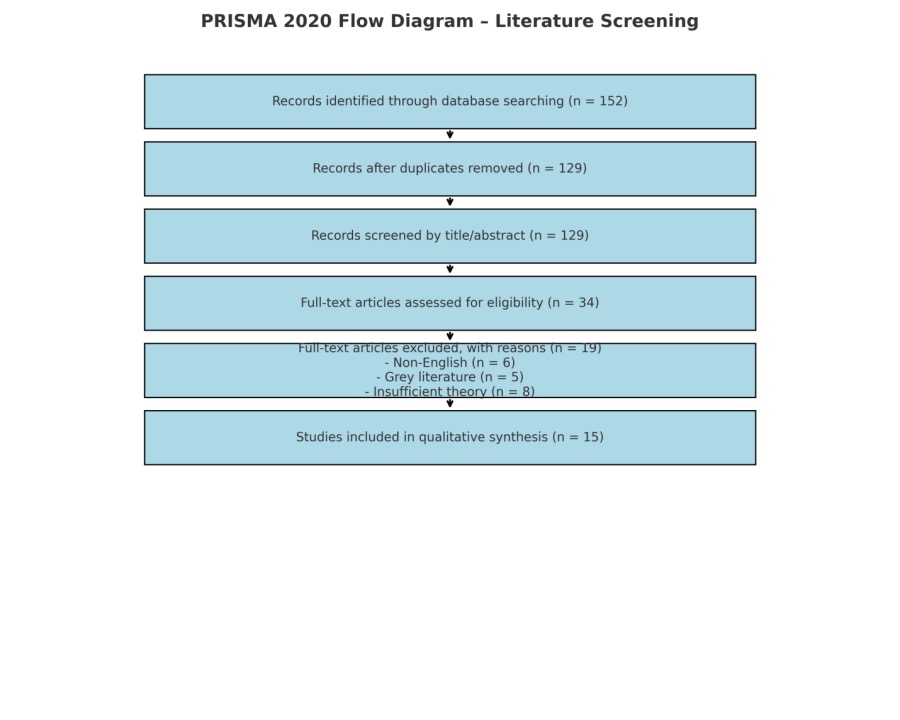SPORT IN CONTEMPORARY SOCIETY: A CRITICAL REVIEW OF SOCIAL THEORIES AND CULTURAL PRACTICES
DOI:
https://doi.org/10.71113/JCSIS.v2i7.376Keywords:
sociology of sport, academic capitalism, field theoryAbstract
This systematic review of the literature sheds light on the generative construction of sport sociology as an academic field, straddled by power relationships, struggles for legitimacy, and gatekeeping disciplines. Acknowledging Malcolm's (2014) seminal critique, theoretical lenses from Bourdieu, Abbott, and Lamont are brought forth to assess how academic capital, jurisdictional claims, and evaluation systems conspire in the configuration of disciplinary boundaries. A PRISMA-guided screening of 15 post-2020 articles published in respected journals produces results suggesting that sport sociology was never generated organically as a disciplinary response to cultural interest in sport but rather was strategically carved within the academic hierarchy-inexcusable resulting in exclusions from feminist, decolonial, and Global South perspectives. Through the interplay of Wacquant's embodied sociology and Connell's Southern Theory, the study offers a critique to the Eurocentric and disembodied posture of dominant paradigms. It also adopts the stirrings of Slaughter and Rhoades' academic capitalism to illustrate how neoliberal evaluation regimes (e.g., REF, ERA) constrict research agendas, thereby impeding critical or practice-based scholarship. Findings further show that sport sociology, as a smaller entity, epitomizes the broader academic fight for epistemic authority, disciplinary legitimacy, and the imbalances afforded by knowledge on a global scale. The review ends by suggesting that the study of the sociology of sport be taken forward in a manner that is more reflexive, inclusive, and politically aware.
Downloads
References
Abbott, A. (1988). The system of professions: An essay on the division of expert labor. University of Chicago Press.
Almeida, S. (2022). Decolonizing critical theory. Routledge.
Andrews, D. L. (2021). Sport, culture and society: An introduction (3rd ed.). Routledge. https://doi.org/10.4324/9780429341942
Biesta, G. (2022). The new language of educational reform: Defining and assessing quality. Journal of Education Policy, 37(3), 335–348. https://doi.org/10.1080/02680939.2021.1903301
Boell, S. K., & Cecez-Kecmanovic, D. (2015). On being 'systematic' in literature reviews. Formulating Research Methods, 33(2), 130–152. https://doi.org/10.1016/j.im.2014.08.008
Booth, A., Sutton, A., & Papaioannou, D. (2016). Systematic approaches to a successful literature review (2nd ed.). SAGE Publications.
Bourdieu, P. (1993). The field of cultural production: Essays on art and literature. Columbia University Press.
Brewer, G. (2021). Interdisciplinarity and the politics of evaluation. Interdisciplinary Science Reviews, 46(2), 123–138. https://doi.org/10.1080/03080188.2020.1867153
Carrington, B. (2020). Time, place and race: A critical review of sport sociology. Sociology of Sport Journal, 37(1), 4–16. https://doi.org/10.1123/ssj.2019-0041
Carrington, B. (2022). Race, sport and politics. In D. Burdsey (Ed.), Routledge handbook of sport and race (pp. 13–25). Routledge.
Connell, R. (2007). Southern theory: The global dynamics of knowledge in social science. Polity Press.
Creswell, J. W., & Poth, C. N. (2018). Qualitative inquiry and research design: Choosing among five approaches (4th ed.). SAGE Publications.
de Sousa Santos, B. (2014). Epistemologies of the South: Justice against epistemicide. Routledge.
Grant, M. J., & Booth, A. (2009). A typology of reviews: An analysis of 14 review types and associated methodologies. Health Information & Libraries Journal, 26(2), 91–108. https://doi.org/10.1111/j.1471-1842.2009.00848.x
Hovden, J., & Tjønndal, A. (2023). Gender, knowledge, and exclusion in sport sociology. International Review for the Sociology of Sport, 58(1), 45–64. https://doi.org/10.1177/10126902221081103
Hylton, K. (2020). Critical race theory and the sociology of sport. In B. Long & K. Hylton (Eds.), Race, ethnicity and sport: Critical race theory perspectives (pp. 17–31). Routledge.
Hylton, K. (2021). Critical race theory and sport sociology. In K. Hylton (Ed.), Routledge handbook of sport and politics (pp. 237–249). Routledge.
Kauppinen, I. (2021). The evaluation of academic disciplines: Metrics and knowledge regimes. Higher Education Quarterly, 75(1), 16–33. https://doi.org/10.1111/hequ.12261
Lamont, M. (2009). How professors think: Inside the curious world of academic judgment. Harvard University Press.
Lury, C., & Wakeford, N. (Eds.). (2012). Inventive methods: The happening of the social. Routledge. https://doi.org/10.4324/9780203853081
Malcolm, D. (2014). The social construction of the sociology of sport: A professional project. International Review for the Sociology of Sport, 49(3–4), 343–364. https://doi.org/10.1177/1012690212465734
Mignolo, W. D., & Walsh, C. E. (2018). On decoloniality: Concepts, analytics, praxis. Duke University Press. https://doi.org/10.1215/9780822371769
Said, E. W. (1983). Traveling theory. In The world, the text, and the critic (pp. 226–247). Harvard University Press.
Sandelowski, M. (2015). Sample size in qualitative research: Reconsidering the concept of saturation. Qualitative Health Research, 25(8), 1043–1050. https://doi.org/10.1177/1049732315583191
Slaughter, S., & Rhoades, G. (2004). Academic capitalism and the new economy: Markets, state, and higher education. Johns Hopkins University Press.
Smith, L. T. (2021). Decolonizing methodologies: Research and Indigenous peoples (3rd ed.). Bloomsbury. https://www.bloomsbury.com/uk/decolonizing-methodologies-9781786998125/
Suri, H. (2020). Meta-synthesis: Expanding the boundaries of systematic review methodology. Routledge. https://doi.org/10.4324/9781315111772
Thomas, J., & Harden, A. (2008). Methods for the thematic synthesis of qualitative research in systematic reviews. BMC Medical Research Methodology, 8(1), 45. https://doi.org/10.1186/1471-2288-8-45
Thorpe, H., Ahmad, N., & Goto, R. (2023). Decolonizing sport studies: Voices from the Global South. Journal of Sport and Social Issues, 47(2), 101–119. https://doi.org/10.1177/01937235221126523
Thorpe, H., & Olive, R. (2022). Interdisciplinarity and identity politics in sport sociology. Qualitative Research in Sport, Exercise and Health, 14(1), 1–17. https://doi.org/10.1080/2159676X.2021.1957257
Thorpe, H., Toffoletti, K., & Fullagar, S. (2023). Feminist new materialisms in sport studies. Sociology of Sport Journal, 40(3), 223–235. https://doi.org/10.1123/ssj.2022-0072
Wacquant, L. (2004). Body & soul: Notebooks of an apprentice boxer. Oxford University Press.
Whitley, R. (2000). The intellectual and social organization of the sciences. Oxford University Press.

Downloads
Published
How to Cite
Issue
Section
License
Copyright (c) 2025 Yangyang Li

This work is licensed under a Creative Commons Attribution 4.0 International License.






















